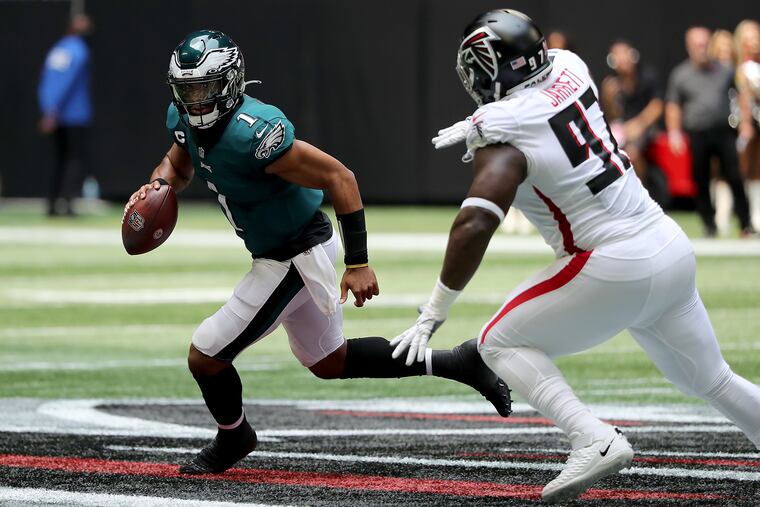The Eagles’ big zero: No turnovers against the Falcons made the difference in Week 1 | Marcus Hayes
Teams that don't turn the ball over win about three-quarters of the time. The kid knew that, and lived by it, as the Birds blew out the Falcons.

Hippocrates said it first, about medicine, but NFL coaches say it more often, about ball security:
First, do no harm.
It’s almost impossible for the opposition to score without the ball. Retention is paramount.
In just his fifth NFL start, the Eagles entrusted the ball to Jalen Hurts to make good decisions 44 times, including offensive penalties and a sack, minus one spike.
He was nearly flawless.
He did much good, but absolutely no harm. Neither did anyone else.
Clearly, this was Hurts’ chief goal in the Eagles’ 32-6 upset opener in Atlanta. And he had the numbers to prove it.
“You don’t turn the ball over — you win the turnover battle — that’s a big thing,” Hurts said, beginning his longest, most thoughtful postgame answer. “I think it’s like a 74% chance, 72% chance you win the game, if you don’t turn the ball over.”
He’s right.
Hurts finished with three touchdown passes. The offensive line allowed just one sack, and that was the result of excellent coverage by the Falcons. Running backs Miles Sanders and Kenneth Gainwell combined for 111 yards and a touchdown on 24 runs. The defense sacked Matt Ryan three times.
Those numbers are great.
That other number — zero — mattered most. Consider the numbers.
In any given year, as Hurts noted, an NFL team that commits no turnovers in a given game wins that game between 70 and 75% of the time.
“It’s good that we didn’t do that,” Hurts said.
It’s bad when they do do it, and they did do it lots last year.
4-11-1, distilled
Carson Wentz’s gravest sins last season involved less his insubordination toward coach Doug Pederson, whose play calls he often would ignore, and less his inability to progress through reads, with which he still struggles in Indianapolis, than with his recklessness. Wentz made horrible decisions. As such, he led the NFL in turnovers, with 19 — 15 interceptions, four lost fumbles — despite playing only 12 games. It was the most marked diversion from Wentz’s norm. He’d thrown 14 interceptions in his first 15 NFL games, as a rookie, but threw just 21 picks in his next 41 games.
Then, 2020.
Wentz’s turnovers were the No. 1 reason the Eagles went 4-11-1. More than injuries to the offensive line, whose lousy blocking often hurried Wentz. More than bad drafting, which left Wentz with poor weapons and worse protection. More than Pederson’s predictability, which Wentz loathed. Washington won the NFC East with a 7-9 record, a mark wholly attainable by even the worst Eagles team since the 3-13 edition of 1998, if Wentz had been more judicious.
Wentz’s departure and Pederson’s firing might turn out well for the Eagles. Already, Nick Sirianni seems more adept as a head coach than did Pederson, who won a Super Bowl. Already, Hurts seems more comfortable in his role as a full-season starter than Wentz did as a rookie in 2016. Both of these early indicators might prove false, but, well, they are what they are.
Regardless, these early indicators resulted in zero turnovers.
Barely.
The Claw
What didn’t happen early in the third quarter might have saved the game for the Eagles.
Hurts faced third-and-5 at the Eagles’ 48. He dropped back, found his receivers covered, then tiptoed — he didn’t sprint, he tiptoed — toward the line of scrimmage. By then, Lane Johnson had to abandon his block.
Hurts didn’t run, and he didn’t throw, and he didn’t feel pressure bearing down on him from behind, and that’s how Falcons outside linebacker Jacob Tuioti-Mariner nearly stole the game’s momentum.
He ran Hurts down and did everything he’s ever been taught to take the ball away. First, his left hand clipped the ball in Hurts’ right hand. Then, his right arm chopped down on Hurts’ right arm.
Somehow, the ball never quavered.
Whether it was Providence, or Spider Tack, or just endless dead lifts and Zottman curls, Jalen Hurts held onto the ball. The Eagles held on to a 15-6 lead and never looked back.
Barely.
» READ MORE: Jalen Hurts’ completion percentage is the magic number for Eagles’ offensive coordinator
No guarantee
Committing zero turnovers doesn’t always result in a win. After all, Hurts and the Eagles didn’t give the ball away once in Game 14 last season but still lost in Arizona, 33-26. Then again, that game saw Kyler Murray pass for 406 yards, 169 of them to DeAndre Hopkins, including the 20-yard, game-winning, fourth-quarter TD pass — which is to say, if the defense stinks, then even the most responsible offense can lose.
In Atlanta on Sunday, the defense did not stink. It surrendered two field goals in the first 16 minutes, nothing thereafter.
However, that defense was aided immeasurably by the fact that the Falcons began only one drive outside of their 25-yard line, and then only 11 yards past that point, and that instance came about as the result of a failed fourth-down attempt, the first of two such failures. But that argument involves analytics and philosophies, and it makes angry old men act angrier and look older, so it can wait for another day.
It’s simpler and truer to just acknowledge that Hurts, and the rest of the skill players and kick returners, for all of the good they did, first, they did no harm.